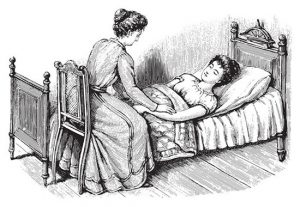For a new CNA, the concept of humor in health care may seem strange.
After all, aren’t we there to provide tender, compassionate care to the sick and disabled? And we know the work is hard. How can there possibly be a place for laughter?
There is little success where there is little laughter.
~ Andrew Carnegie
It is not a recent innovation.
Back in the thirteenth century, before there was anesthesia, surgeons used humor to keep their patients from dwelling on the pain. Almost forty years ago, Norman Cousins famously claimed to have cured himself of a serious and painful illness by watching comedy and laughing. (He wrote a book, Anatomy of an Illness, about his experience.)
Laughter is a tranquilizer with no side effects.
~ Arnold H. Glasow
Laughter and humor definitely belong in your workplace. Both staff and patients can benefit from being lighthearted at times. Researchers have discovered that a good belly laugh has the following effects on the body:
- It increases oxygen levels, improving alertness and memory.
- It stimulates the heart and lungs, improving circulation and lowering blood pressure.
- It causes the abdominal muscles to work, much like doing sit-ups.
- It releases endorphins, the body’s “feel-good” chemicals and painkillers.
- It energizes the immune system to keep you healthy.
Just as important as the physical benefits of laughter are its impressive ability to relieve stress.
There is no shortage of stress in health care; most of us experience it at least once a day when we’re at work. Here is how humor helps:
- It reduces the stress hormones cortisol, adrenaline, and dopamine.
- It displaces negative emotions like anger and frustration.
- It offers us the opportunity to view events from a new perspective.
- It brings us together as we share the moment.
- It leads to a pleasant sense of well-being.
Laughter need not be cut out of anything, since it improves everything.
~ James Thurber
Laughter serves another purpose in health care. For those of us who work with very ill or fragile patients, see patients dying, or feel helpless when our best efforts fail, humor is our escape. To outsiders, it might look as if we don’t care, but in fact, we care more than we can express. We joke because we can’t control the situation or the outcome. It’s called “sick humor,” but it’s how we cope with the heartbreak of our careers.
Patients use humor to handle stress, too. They may laugh or joke at their disease to conceal the stress they are feeling. They can be scared, nervous, or uncertain. A joke becomes a way of asking for support and reassurance. A wise CNA will listen for the message behind the remark and encourage the patient to talk.
Laughter is the shortest distance between two people.
~ Victor Borge
Using laughter and humor with your patients can build relationships. It also lets them feel that they are being treated as valuable individuals, not just as patients on your assignment list. It’s a great tool to erase the embarrassment that comes with some procedures. While cleaning up an incontinent patient who kept apologizing, one nurse said, “Better out than in!” They both laughed, and the tension disappeared. Another CNA reported that while she had been helping a male patient ambulate, he had slipped, and they both went to the floor as she broke his fall. “We have to stop meeting like this,” he quipped, and they enjoyed a good laugh together.
It’s great for patients with Alzheimer’s disease or other types of dementia.
One three-year study showed that when these patients laughed and smiled more, there was a 20% drop in their levels of anxiety, resulting in fewer outbursts and less wandering. The effect was the same as that of taking an antipsychotic drug! While dementia eventually leads to a total loss of humor, humor can be therapeutic for some individuals.
You might think that cancer patients would be the last people to find anything humorous. Still, many oncology units have “Tumor Humor” groups where patients can get together to laugh. Humor is a way to reduce depression and anxiety and make it possible to talk more openly about a serious topic.
Of course, pediatric patients adore humor, and it’s easy to joke with them. Children’s hospital and emergency room staffs are experts at making their young patients smile when they know something is wrong. Humor is helpful for parents, too. Seeing their children laugh helps them relax. It also lowers the barrier between parents and professionals; both can feel more comfortable together.
The most wasted of all days is one without laughter.
~ E. E. Cummings
By now, you should see that humor does belong in the health care workplace. You, your co-workers, and your patients can feel better by adding some laughter to the schedule.
Start with your colleagues. Celebrate holidays and birthdays. Hold theme days. Decorate the break room. Use humor to ease stress and frustration. Laugh together at the rough days. “How much worse can this get?!” can actually be funny.
Your good mood can extend to your patients and residents.
Ask them to tell you funny stories about their childhood or work. Laugh at their attempts to make you smile. Use light humor to gain their cooperation. Food can be fun, too—who doesn’t love an ice cream social?
Humor is a very serious thing.
~ Winston Churchill
There is a ground rule for using humor. Humor is never appropriate if it is sarcastic, belittling, intimidating, or humiliating. Be careful about the timing of humor, too. Use judgment when someone is in shock or unable to cope. Avoid dark humor with patients who are ill; they can use it themselves, but it’s not appropriate for you to start it or join in.
There is always something to laugh about. Find something to smile about every day. Help your patients smile, too. Pass your good mood on to others and watch everyone around you feel better.
I try to find a reason to laugh each day. Somehow, if you can incorporate laughter into your day, every day, it really helps. It’s the little things in life that make me happy.
~ Faith Hill
 By
By 



